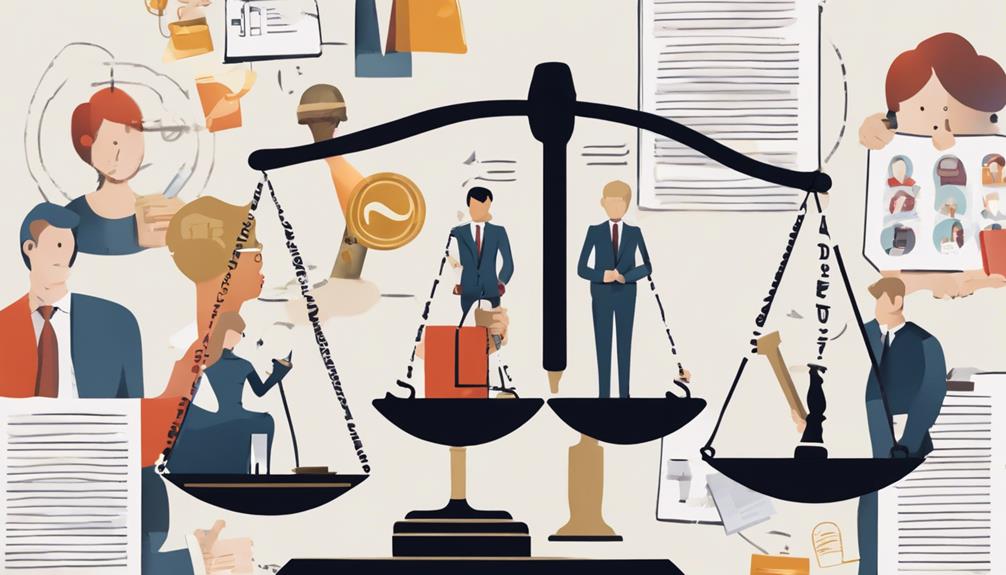When you're looking for legal representation in Overland Park, KS, lawyer ratings can be an essential tool in guiding your choice. These ratings reflect a blend of client feedback, peer assessments, and the lawyer's professional achievements, offering you a clearer picture of their capabilities. Understanding how these ratings are determined and what factors influence them might just change the way you approach your search for legal help. So, what should you consider when evaluating these ratings to ensure you find the right attorney for your needs?
Importance of Lawyer Ratings

When it comes to finding the right attorney, understanding lawyer ratings can make all the difference. You want someone who's not just qualified but also respected in their field. Ratings provide a quick snapshot of an attorney's reputation, reflecting their experience, client satisfaction, and overall effectiveness. By focusing on these ratings, you can gain insights that save you time and effort in your search.
High ratings often indicate a track record of success and positive client experiences. This can help you feel more confident in your choice, knowing that others have had favorable outcomes with that attorney. Conversely, low ratings might raise red flags, suggesting potential issues you'll want to investigate further.
Moreover, lawyer ratings can highlight specific areas of expertise, making it easier for you to find an attorney who specializes in the legal matters you're facing. Whether you're dealing with family law, criminal defense, or business litigation, targeted ratings can guide you in the right direction.
Ultimately, leveraging lawyer ratings not only empowers you to make informed decisions but also sets the stage for a more fruitful attorney-client relationship.
How Ratings Are Determined
Lawyer ratings are typically determined through a combination of client feedback, peer evaluations, and professional achievements. When you consider hiring a lawyer, you'll find that client feedback plays a crucial role. Satisfied clients often share their experiences, which can significantly influence a lawyer's rating. Conversely, negative reviews can draw attention to potential issues.
Peer evaluations are another vital factor. Fellow attorneys assess each other's skills, integrity, and professionalism. This input helps create a more balanced view of a lawyer's capabilities, as it comes from those who understand the legal field intimately.
Professional achievements also contribute to ratings. Factors like years of experience, successful case outcomes, and any awards or recognitions can enhance a lawyer's standing. These accomplishments signal reliability and expertise, giving you more confidence in your choice.
Every rating system may weigh these components differently, but they all aim to provide a comprehensive overview of a lawyer's qualifications. Ultimately, understanding how ratings are determined can empower you to make informed decisions and choose the right legal representation for your needs.
Sources for Lawyer Ratings

Numerous sources provide lawyer ratings, helping you navigate your options effectively. You can start with websites like Avvo, which offer ratings based on client reviews, attorney endorsements, and professional achievements. These ratings often give you a quick snapshot of a lawyer's reputation.
Another reliable source is Martindale-Hubbell, known for its peer review ratings. Here, lawyers are evaluated by their peers in the legal community, providing insight into their professionalism and ethical standards.
You might also want to check the Better Business Bureau (BBB), where you can find ratings based on client complaints and resolutions.
Local bar associations often publish their own lawyer directories, which may include ratings based on various criteria, including experience and practice areas.
Social media platforms like LinkedIn can also be useful. They often feature recommendations and endorsements from colleagues and clients.
Understanding Rating Scales
Rating scales play a crucial role in evaluating lawyers, as they provide a structured way to compare qualifications and performance. When you look at these scales, you'll often see numerical ratings or letter grades that reflect a lawyer's skills, ethics, and client satisfaction. Each scale typically ranges from a low to a high rating, helping you quickly identify which lawyers stand out in their field.
Most rating systems break down various aspects of a lawyer's practice, such as legal knowledge, communication skills, and professionalism. You might notice that some scales include client reviews or peer evaluations, adding more depth to the rating. This way, you're not just seeing a number, but also insights into how the lawyer interacts with clients and peers.
It's essential to understand the context of these ratings. Different organizations might use distinct criteria, so a lawyer rated highly in one system may not have the same standing in another.
Therefore, when you're using these ratings to make decisions, consider the scale's methodology and how it aligns with your specific needs. This will help you find the right lawyer for your situation.
Factors Influencing Ratings

When evaluating lawyer ratings, several factors come into play that can significantly impact the final scores.
First, a lawyer's experience is crucial. The number of years they've practiced and their familiarity with specific legal areas can influence how peers and clients perceive their competence.
Next, education and training matter. Graduating from a reputable law school or participating in continuous legal education can enhance a lawyer's credibility.
Additionally, specialization in certain fields, like family law or criminal defense, can affect ratings by showcasing expertise.
Professional affiliations also play a role. Membership in legal associations or bar organizations can indicate a commitment to ethical standards and professional development, which can boost ratings.
Another factor is the lawyer's track record of case outcomes. Success in previous cases can lead to higher ratings, as it reflects their ability to achieve favorable results for clients.
Client Reviews and Testimonials
Client reviews and testimonials can significantly shape your perception of a lawyer's capabilities and reliability. When you're searching for legal representation in Overland Park, these reviews give you insight into other clients' experiences. You'll find that many former clients share their stories about how the lawyer handled their case, communicated throughout the process, and achieved results.
Reading through these testimonials can help you identify specific strengths or weaknesses in a lawyer's practice. For instance, some clients may highlight a lawyer's responsiveness and dedication, while others may point out issues with communication or timeliness. This firsthand information can be invaluable, guiding you to make a well-informed decision.
Additionally, don't just rely on a single review; look for patterns. If multiple clients mention similar positive or negative experiences, that's likely an accurate reflection of the lawyer's overall performance.
It's also helpful to check various platforms for reviews, as some websites may have more detailed feedback than others. Ultimately, taking the time to read client reviews can give you a clearer picture of what to expect, ensuring that you choose a lawyer who aligns with your needs and expectations.
Top Rated Lawyers in Overland Park

Finding top-rated lawyers in Overland Park can make a significant difference in your legal journey. These professionals bring expertise, experience, and a proven track record to the table, which can enhance your chances of a favorable outcome. Top-rated lawyers often receive high ratings from clients and peers alike, reflecting their commitment to excellence.
When you're facing legal challenges, you want someone who understands the nuances of the law and can navigate the complexities of your case. The best lawyers in Overland Park are known for their strong communication skills, responsiveness, and dedication to their clients. They take the time to listen to your concerns and work collaboratively to develop a strategy that meets your needs.
Moreover, top-rated lawyers typically have a wealth of experience in specific practice areas, whether it's family law, criminal defense, or personal injury. This specialization allows them to provide tailored advice and representation.
In your search for legal representation, don't hesitate to explore online reviews, ask for referrals, and check local bar association ratings.
Top-rated lawyers can be your greatest advocates, guiding you through every step of the legal process. Choose wisely!
Tips for Choosing a Lawyer
Choosing the right lawyer can feel overwhelming, especially with so many options available. To simplify your decision, start by identifying your specific legal needs.
Whether it's family law, criminal defense, or business matters, knowing your focus helps narrow your search. If you're considering estate planning, it may be beneficial to explore world-class legal services offered by specialized firms.
Next, seek recommendations from friends, family, or online reviews. Personal experiences can provide valuable insights into a lawyer's expertise and character.
Once you've shortlisted a few candidates, check their credentials and experience. You want someone with a solid track record in your specific area of law.
Don't hesitate to schedule consultations with potential lawyers. Many offer free initial meetings, allowing you to assess their communication style and approach.
During these meetings, ask about their fees and payment structures to ensure they fit your budget.
Conclusion
In conclusion, lawyer ratings in Overland Park, KS, are essential tools for finding the right legal representation. By understanding how these ratings are determined and what factors influence them, you can make informed choices. Client reviews and testimonials provide valuable insights into an attorney's performance. Remember to consider top-rated lawyers while keeping your specific needs in mind. With the right information at your fingertips, you're well-equipped to choose a lawyer who can effectively advocate for you.

